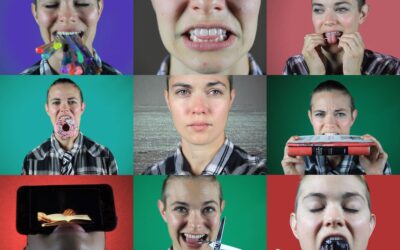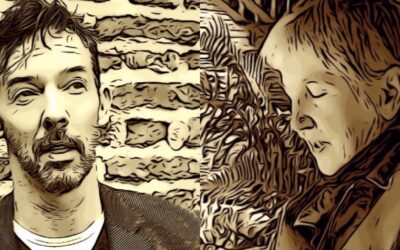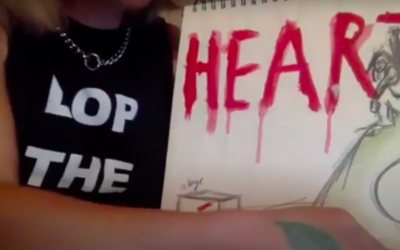Similarly to how this collection of recordings rematerialises the metaphor of voice and voicelessness, queer sonics play out across Lend Me Your Ears in ways that anchor the idea of queerness and of its intrinsic futurity to bodily and social reality. In their conversation ‘To Sound Ourselves’, Jane Boston and Matthew Mills – respectively a lecturer in voice studies and a speech and language consultant in a gender identity clinic – delicately unravel not only the public question of being heard, but before that, the more private question of sounding like oneself: the difficult and sometimes psychologically gruelling work (but highly rewarding nevertheless) of finding the voice we recognise as our own through the recognition of difference. What is special about this conversation is that it sheds light on how a kind of labour on the self ‘vibrates’ across our relationships with others, and what might initially appear as a conversation about a solitary exploration reveals itself as a conversation about community. Boston’s work with the collective Siren exemplifies this idea from the side of praxis, and again blows into the heart of what it yields to undo institutional norms by ‘finding one’s voice in the collective’. We hear Siren’s track ‘Sounding Different’ in its entirety in this Salon, the chorus of which urges us to ‘listen out for overtones/ out in the deep’.
In a different key, Emma Frankland’s performance Hearty (2016) – the fifth and final show in a cycle of performances about her gender transition – also explicitly exists at the seam between self and community. So much so that her entire Laboratory is structured according to the words of others: the responsibility of holding and ‘honouring’ the words of other people, of giving courage and encouragement through voicing each other is central to her practice. The direct quote – immersed here in methodologies both scholarly and spectacular that engage in oral history and microhistory, participant observation, words made precious through face-to-face transmission – is where Frankland locates the possibility of making a history, a genealogy, and thus a belonging for trans identities. Apart from showing us round the making of a riotous and very personal piece of theatre about trans identities (and much more), this documentary with Frankland allows us to appreciate the affective register of her life as well as her work, poised between wariness, weariness and fearless enthusiasm. As José Esteban Muñoz reminds us, ‘hope and disappointment operate within a dialectical tension in this notion of queer utopia’ (2009: 155) and this is fully reified in Frankland’s work.
Aural/Oral Dramaturgies artist in residence sair goetz’s work has moved, since the 2018/2019 work Break Your Voice, towards an interest in ventriloquism, connected deeply to the notion of ‘queering’ in their work. The queer potentiality intrinsic to ventriloquism as a practice – speaking oneself as not-I, speaking as an-other, speaking in ‘more than one voice’ to borrow a phrase from Adriana Cavarero, whose influential text For More Then One Voice (2005) returns often in this collection – appears in sair’s reflections both in their Gallery and in their Laboratory. Cavarero’s work insists on voice as relational and reciprocal in order to rearrange our understanding of the concept of logos, and while again working on ‘sounding oneself’ is critical in goetz’s practice, perhaps sounding ‘other’ is even more important – an other which might be other to the human, even, an other which is capable of shifting epistemological and taxonomical boundaries. sair’s current research is devoted majorly to British ventriloquist Terri Rogers, whose technical mastery, in sair’s words ‘makes magic happen, actual magic, because there is nobody else who can embody two different genders and not have people screaming for the hills’ (LMYE Laboratory #5, 2021: 7).
Works Cited
Cavarero, Adriana (2005) For More than One Voice: Toward a Philosophy of Vocal Expression, trans. Paul A. Kottman, Stanford: Stanford University Press.
Muñoz, José Esteban (2009) Cruising Utopia: The There and Then of Queer Futurity, New York:
New York University Press.
Radosavljević, Duška; Pitrolo, Flora; Salazar Cardona, Juan Felipe; goetz, sair (2021) LMYE Laboratory #5: sair goetz – The Making of THE ABCs AND XYZs OF LMNs (2020-2021), Auralia.Space, Royal Central School of Speech and Drama, https://doi.org/10.25389/rcssd.14061770.v2.





